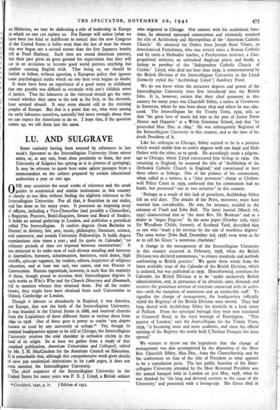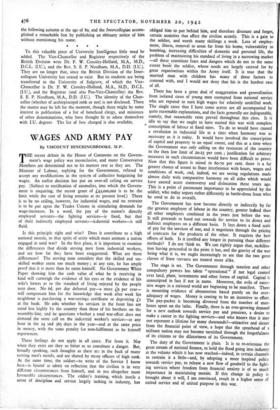I.U. AND SULGRAVE
Some curiosity having been aroused by references in last week's Spectator to the Intercollegiate University (from whose ashes, or, at any rate, from close proximity to them, the new University of Sulgrave has sprung or is in process of springing), It may be relevant to quote here some salient passages from a memorandum on the subject prepared by certain educational authorities a year or two ago.
0 NE may scrutinise the usual works of reference and the usual guides to academical and similar institutions in this country as closely ai one likes without finding the slightest reference to the Intercollegiate University. For all that, it flourishes in our midst, and has done so for many years. It possesses an imposing array of officers, including a Vice-Chancellor (and possibly a Chancellor), a Registrar, Proctors, Bedel-Esquires, Senate and Board of Studies. It holds an annual gathering in London, and publishes a periodical called The Intercollegian. It confers degrees (from Bachelor to Doctor) in divinity, law, arts, music, philosophy, literature, science, and commerce, and awards University Fellowships. It holds degree examinations nine times a year ; and (to quote its Calendar) no arbitrary periods of time are imposed between examinations' It has attracted to its ranks men of such diverse standing and interests as journalists, baronets, schoolmasters, barristers, rural deans, high sheriffs, episcopi vagantes, lay readers, editors, inspectors of religious education, and at least one earl, one canon, and one Proctor in Convocation. Human ingratitude, however, is such that the majority of these, though proud to mention their Intercollegiate degrees in such works as Who's Who and the Church Directory and Almanack, fail to mention whence they obtained them. For all the reader knows, they might have been obtained from such Universities as Oxford, Cambridge or London.
Though it labours so abundantly in England, it was America, not Europe, that saw the birth of the Intercollegiate University. It was founded in the United States in 1888, and received charters from the Legislature of three different States at various dates from 1890 to 1938. One of these gave it power to confer any degree known or used by any university or college?* Yet, though its nominal headquarters appear to be still at Chicago, the Intercollegiate University receives the cold shoulder in orthodox circles in the land of its origin. So at least we gather from a study of that standard publication, American Universities and Collegest, edited by Mr. J. H. MacCracken for the American Council on Education. It is remarkable that, although this comprehensive work gives details of over 50o academical institutions in its 1,o66 pages, it does not even mention the Intercollegiate University.
The chief organiser of the Intercollegiate University in the United States for many years was F. E. J. Lloyd, a British subject
* Crockford, 1940, p. iv. t Edition of 1932. who migrated to Chicago. Not content with his academical func- tions, he obtained episcopal consecration and ultimately assumed the title of Archbishop and Metropolitan of the • American Catholic Church.' He obtained his Orders from Joseph Rene Vilatte, an Americanised Frenchman, who was several times a Roman Catholic and by turns a Methodist teacher, a Presbyterian minister, a Con- gregational minister, an unfrocked Anglican priest, and finally a bishop in partibus of the Independent Catholic Church of Ceylon.' Lloyd, who died not later than 1939, is commemorated by the British Division of the Intercollegiate University in the Lloyd (formerly styled the Archbishop Lloyd ') Auxiliary Fund.
We do not know when the attractive degrees and gowns of the Intercollegiate University were first introduced into the British Isles. It is, however, certain that their chief promoter in this country for many years was Churchill Sibley, a native of Crewkernc in Somerset, where he was born about 1859 and where he was edu- cated. The Intercollegian for the Trinity Term, 1939, tells us that ' his great love of music led him to the post of Junior Form Master and Organist' at a Welsh Grammar School, and that he proceeded Mus. Doc. in 1894.' He was subsequently Registrar of the Intercollegiate University in this country, and at the time of his death President of it.
Like his colleague in Chicago, Sibley aspired to be in a position which would enable him to confer degrees with one hand and Holy Orders with the other, so to speak. He accordingly made a pilgrim- age to Chicago, where Lloyd consecrated him bishop in 1929. On returning to England, he assumed the title of Archbishop of the Orthodox Catholic Church in England,' and consecrated at least three others as bishops. One of the prelates of his communion, when called as a witness in a false pretences' charge at Clerken- well Police Court in 1939, confessed that his communion had no funds, but possessed ' one or two oratories' in this country.
• Perhaps as a result of this lack of proselytes, Archbishop Sibley fell on evil days. The attacks of the Press, moreover, must have worried him considerably. He was, for instance, assailed in the columns of Truth and John Bull. The latter journal (March 7th, 1931) characterised him as • the most Rev. Dr. Bunkum' and as a dealer in ' bogus Degrees.' In the same paper (October 12th, 1935) Sir Wyndham Childs, formerly of Scotland Yard, described him as one who • made a fat revenue by the sale of worthless degrees.' The same writer (John Bull, December 3rd, 1938) even went as far as to call his Grace a notorious charlatan' A change in the• management of the Intercollegiate University in this country occurred in February, 1938, when the British Division was declared autonomous, to ensure standards and methods conforming to British practice.' We quote these words from the latest available issue of the Calendar of the British Division, which is undated, but was published m 1939. Henceforward, continues the Calendar, the British Division is to be under exclusively British administration, and, in pursuance of its altruistic aims, demands and receives the gratuitous services of everyone connected with its activi- ties—with the exception of examiners and an irreducible staff.' To signalise the change of management, the headquarters (officially styled the Registry) of the British Division were moved. They had long shared with Archbishop Sibley his domicile in a back street of Fulham. From the episcopal borough they were now translated to Cromwell Road, in the royal borough of Kensington. This quarter of London,' says the Intercollegian for the Trinity Term, 1939, is becoming more and more academic, and since the official opening of the Registry the newly built L'Institut Francais has been opened.'
We venture to throw out the hypothesis that the change of management was also accompanied by the deposition of the Most Rev. Churchill Sibley, Mus. Doc., from the Chancellorship and by the conferment on him of the title of President as what appears to be a- consolation prize. The last public function of the Inter- collegiate University attended by the Most Reverend President was the annual banquet held in London on 31st May, 1938, when he was thanked for • his long and devoted services to the cause of the University,' and presented with a loving-cup. His Grace died in the following autumn at the age of 8o, and the Intercollegian accom- plished a remarkable feat by publishing an obituary notice of him without mentioning his name.
To this valuable piece of University Intelligence little need be added. The Vice-Chancellor and Registrar respectively of the British Division were Dr. F. W. Crossley-Holland, M.A., M.D., D.C.L. (I.U.), and the Rev. S. E. P. Needham, M.A., D.D. (I.U.). They are no longer that, since the British Division of the Inter- collegiate University has ceased to exist. But its students are being transferred to the University of Sulgrave, of which the Vice- Chancellor is Dr. F. W. Crossley-Holland, M.A., M.D., D.C.L. (I.U.), and the Registrar (and also Pro-Vice-Chancellor) the Rev. S. E. P. Needham, M.A., D.D. (I.U.). The identity of the Chan- cellor (whether of archiepiscopal rank or not) is not disclosed. There the matter may be left for the moment, though there might be some interest in publication of a list of beneficed clergy, and ministers of other denominations, who have thought fit to adorn themselves with I.U. degrees. The list of fees charged is also available.



























 Previous page
Previous page